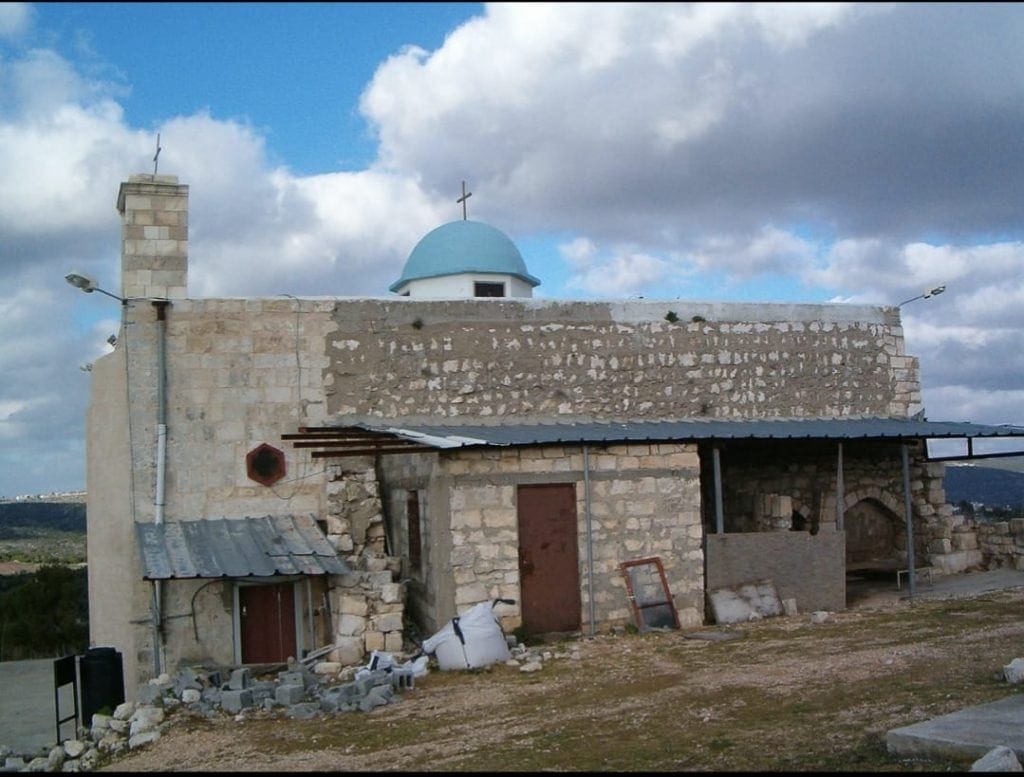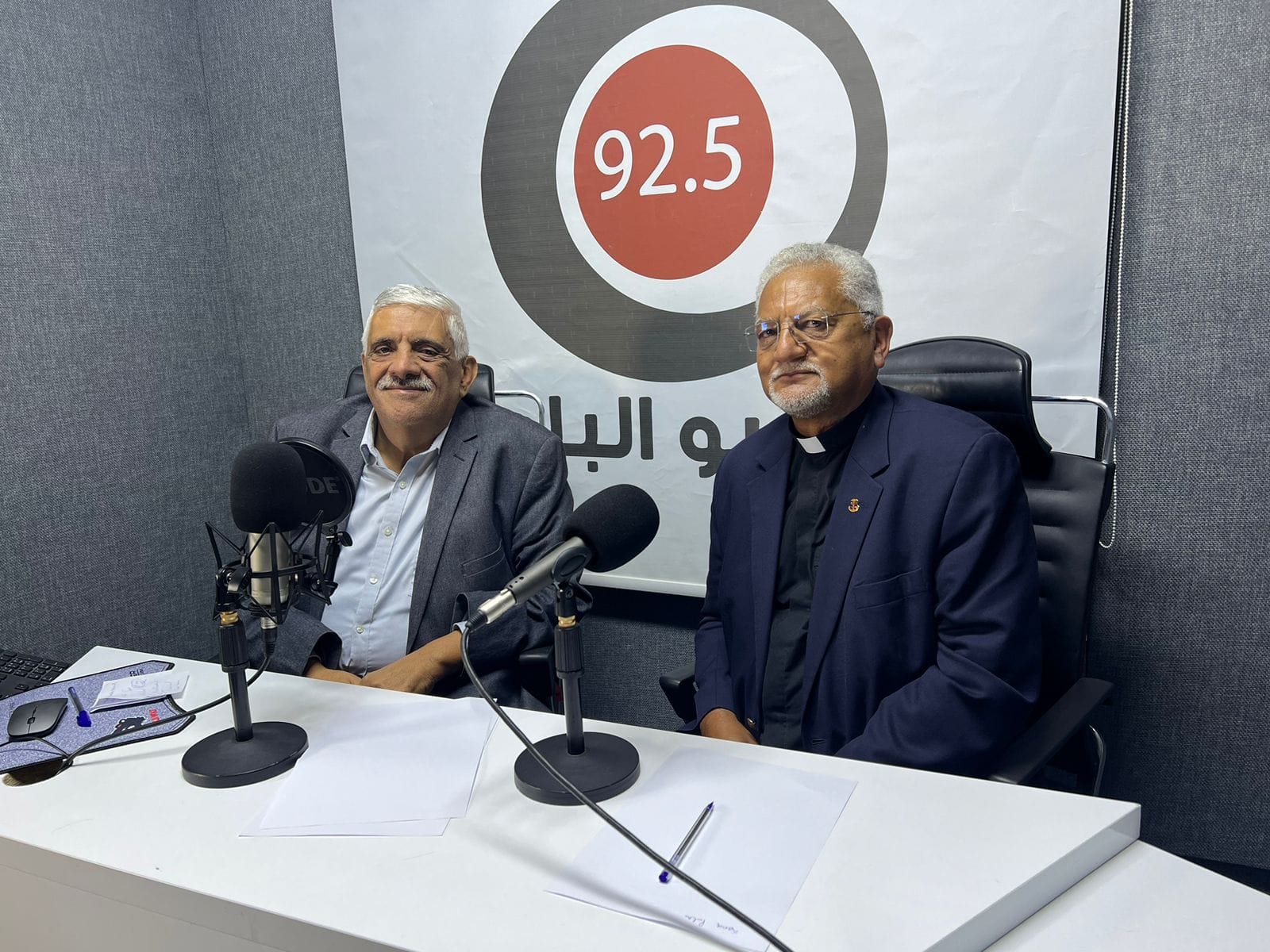
Previous ِA rocket hits the village of Iqrit and the Church guard escapes death

By Daoud Kuttab
The World Methodist Council General Secretary, Bishop Ivan Abrahams, criticized what he called the “genocide” of Israel against Palestinians. “Many of us have been lost for words, and those are the only words that come to mind, genocide, and ethnic cleansing. And there is no other way to explain it. And the moral role of the church and the moral role of people who believe in human rights has been affected, he said in a radio interview in Amman, Jordan.”
The South African leader and member of the ANC said that he believes biblically Zionism must be destroyed. “We need to look for the liberating and liberative text within the scriptures. And there are many. And that is, there is no place for Zionism. Zionism needs to be destroyed. That is a myth.,” he said.”
Abrahams along with Church leaders from South Africa, Ecuador, Canada, and the United States, stopped on their way home in Jordan after spending a solidarity visit to Bethlehem on Christmas. The delegation attended a powerful Palestinian Church ceremony at the Lutheran Christmas Church in Bethlehem, the city of the birth of Jesus. The delegation had wanted to visit the Rafah crossing point and meet with patients in Egyptian hospitals but was unable to do so due to the lack of permission from the government of Egypt.
Below is the text of an interview he gave to Radio al Balad in Amman, Jodan December 27th, 2023:
Kuttab: Reverend Ivan, how are you? Thank you for coming to our Radio station and thank you for your solidarity visit to Palestine and Jordan. Tell us how your visit and your delegation got started, whose idea it was and what was the main purpose of coming to our region?
Abrahams: Thank you, Daoud, and thank you to your listeners. We are a group mainly from South Africa but also from Ecuador as well as the United States and Canada. And we responded to an invitation from Christians in Palestine wanting us to express solidarity and we have come to look, to learn, and to listen and to see what we can do to strengthen our solidarity with Christians and Muslims and everybody in Palestine.
Kuttab: Your visit was risky. Was there any opposition from your family, from your church, from the community? Were you afraid of what you were going into?
Abrahams: Well, many of the folks from the South African side that were on the visit were part of the struggle against apartheid. And so, it is our faith that guides protects, and spurs us on. In actual fact, I can say that we belong to a restless and impatient generation whose lives have been shaped on the anvil of the apartheid struggle. And we have sung during the apartheid years, freedom in our lifetime, and we are committed to see freedom for Palestinians in our lifetime and that is what we will work towards
Kuttab: You are very well appreciated for being in Palestine and Jordan. You said you came to hear, to listen, and to see. What were the main conclusions you have produced since your visit to Palestine?
Abrahams: Well, we always knew that Israel was an apartheid state, but we are more convinced by what we have experienced. And we struggle to understand the callousness and that there just does not seem to be any humanity in what is happening, especially in Gaza at the moment.
Kuttab: Many people ask us, why are the churches in the world quiet? Including, I mean, even though human rights have been violated, Palestinians are subjects of genocide, Christians are being sniped and killed and attacked, and churches are being attacked. So, what is your opinion?
Abrahams: Why have the churches been quiet? Well, there has been an accusation that our silence is complicity, and I hope that with us being in Bethlehem, this will break the silence. And we are hoping that our visit will give traction. There have been protests in major capitals of the world, and there have been petitions, but I feel that we need to go further and that there needs to be concrete action.
Kuttab Palestinian Christian leaders signed a statement calling on church leaders to repent. Some thought that this was too harsh, and some thought that it was appropriate. Where do you stand on this request for the churches to take, as you said, action?
Abrahams: Well, I think the action begins with confession, with repentance, and with amplifying our voices, especially to get our political leaders, who seem to be tone-deaf, to get them to take action. Because many, many of the leaders, whether it is Biden in the United States and folks all around the world, are, if not members of churches, at least members of some religious organization. And it is a moral imperative of all religions to work for justice and for peace, and to stop the violence and the killing that we see in Gaza.
Kuttab: You are the General World Secretary of the Methodist Church. Can you tell us more about where the Methodist Church stands in all of this? What have your positions been in regard to Palestine, and the effort for Palestinian liberation and freedom?
Abrahams: Well, the World Methodist Council took a resolution 70 years ago on Israel-Palestine, seeking the self-determination of Palestinians, and we stand by that. Part of our commitment was to open a Methodist liaison office in East Jerusalem, and there is support amongst the eighty-two million Methodists around the world. There is not one Methodist church or institution that doesn’t have a resolution on Palestine.
Kuttab: South Africa, is a country of sixty million or more, I do not know. But the biggest churches have a council. I think you are involved in this council. Tell us what the Council of Churches in South Africa has done, what is their position, and what needs to be done to increase cooperation with them.
Abrahams: Well, the Council of Churches in South Africa is composed of about forty million Christians, and they have been at the forefront of Palestine/Israel. They are working with BDS [Boycott, Divestment and Sanctions] and other groups that are supporting Palestine, and they were also the progenitors of the Kairos document that speaks about state theology, church theology, and prophetic theology. And the South African Council of Churches is very much in the tradition of prophetic theology. And we do not have a clearly developed campaign, but I am sure that the whole issue of BDS is going to come up again, although we support groups within the BDS, [we hope] to get the whole council to support BDS)
Kuttab: So, [regarding] the boycott, the divestment, and sanctions, which was actually following the anti-apartheid policy are you planning anything in the future in terms of bringing about the understanding of South Africans of the similarities between the apartheid situation that you’ve overcome and the apartheid situation the Palestinians have not overcome yet?
Abrahams: Yeah, there are real similarities between apartheid South Africa and apartheid Israel.
And we have seen in our country the only things that worked besides the resistance were boycotts, divestments, and sanctions. And I am sure that the council is going to take a much stronger line because that is what led to our liberation in South Africa.
Kuttab: Do you plan anything to deal with this issue? Do you have any conferences planned?
Abrahams: Yes, we are planning a major conference that will take place in South Africa in May, and that will draw together the international community to participate against this apartheid that is experienced in Israel.
Kuttab: Palestinians are calling what is happening in Gaza a genocide. What do you think about this? Is this a correct term? Do you see signs of genocide happening? How do you explain what is happening every day in Gaza now?
Abrahams: Well, many of us have been lost for words, and those are the only words that come to mind, genocide, and ethnic cleansing. And there is no other way to explain it. And the moral role of the church and the moral role of people who believe in human rights has been affected.
Kuttab: Many people here have lost faith in concepts like human rights. Should we abandon these concepts? Should we hold on to them regardless of some countries abandoning them? How should we deal with the apathy people have today with Western countries preaching about human rights? You know, Reverend Munther in his lament said, Europeans do not tell us anymore, do not preach to us about human rights. How should we deal with this problem that people have lost faith in morality in many countries?
Abrahams: Yeah, I do not think that the Western countries hold the moral high ground. It is then that we need to listen more carefully to the voices of the oppressed, to the voices of the victims. I cannot understand how Israel wants to play the victim in this situation. In actual fact, they are not the victims. They are the aggressors. And part of the Kairos theology and Kairos document was to call out the oppressor. Somebody cannot take something from you and then give it back and think that everything is okay. There needs to be restitution. There needs to be asking for forgiveness before we can move forward.
Kuttab: Pastor Ivan, in the South African struggle against apartheid, the Bible was weaponized. And in our struggle as Palestinian Christians, we are seeing that also the Bible is being weaponized. What advice do you have? How do we deal with Christian Zionists?
Abrahams: Well, we need to look for the liberating and liberative text within the scriptures. And there are many. And that is, there is no place for Zionism. Zionism needs to be destroyed. That is a myth.
Kuttab And biblically, how do we deal with that?
Abrahams: Again, I want to say is that we need to extract the liberative text that speaks out against any form of oppression and any form that considers some people special. All of us are special.
We are all children of God. The fact that the Creator blows life into us, whether we are Muslim, or Jewish, no matter what faith, we belong to, the Creator has blown life into all of us. And we need to respect the sanctity of life.
Thank you so much, Reverend Ivan. Abrahams of the South African Church and Secretary General of the World Methodist General Assembly. And thank you for your strong stand in support of justice for Palestinians.


تكافح مجلة “ملح الأرض” من أجل الاستمرار في نشر تقارير تعرض أحوال المسيحيين العرب في الأردن وفلسطين ومناطق الجليل، ونحرص على تقديم مواضيع تزوّد قراءنا بمعلومات مفيدة لهم ، بالاعتماد على مصادر موثوقة، كما تركّز معظم اهتمامها على البحث عن التحديات التي تواجه المكون المسيحي في بلادنا، لنبقى كما نحن دائماً صوت مسيحي وطني حر يحترم رجال الدين وكنائسنا ولكن يرفض احتكار الحقيقة ويبحث عنها تماشيًا مع قول السيد المسيح و تعرفون الحق والحق يحرركم
من مبادئنا حرية التعبير للعلمانيين بصورة تكميلية لرأي الإكليروس الذي نحترمه. كما نؤيد بدون خجل الدعوة الكتابية للمساواة في أمور هامة مثل الإرث للمسيحيين وأهمية التوعية وتقديم النصح للمقبلين على الزواج وندعم العمل الاجتماعي ونشطاء المجتمع المدني المسيحيين و نحاول أن نسلط الضوء على قصص النجاح غير ناسيين من هم بحاجة للمساعدة الإنسانية والصحية والنفسية وغيرها.
والسبيل الوحيد للخروج من هذا الوضع هو بالتواصل والنقاش الحر، حول هويّاتنا وحول التغييرات التي نريدها في مجتمعاتنا، من أجل أن نفهم بشكل أفضل القوى التي تؤثّر في مجتمعاتنا،.
تستمر ملح الأرض في تشكيل مساحة افتراضية تُطرح فيها الأفكار بحرّية لتشكل ملاذاً مؤقتاً لنا بينما تبقى المساحات الحقيقية في ساحاتنا وشوارعنا بعيدة المنال.
كل مساهماتكم تُدفع لكتّابنا، وهم شباب وشابات يتحدّون المخاطر ليرووا قصصنا.